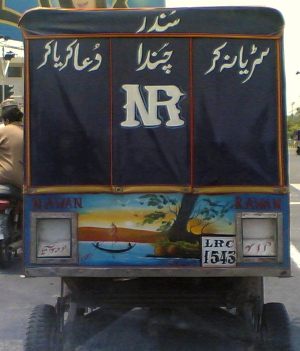Adil Najam
 This picture from Metroblog Lahore made me laugh out loud. One could think of some ATP commentators that we might want to say this to!
This picture from Metroblog Lahore made me laugh out loud. One could think of some ATP commentators that we might want to say this to!
Given the type of comments recent posts have been recieving, the refrain written at the back of this rickshaw, or at least it’s first half, seems funnily appropriate. The Punjabi words at the back read: “SaRRya na kar, chanda, dua karya kar.” I don’t think justice can be done to this in translation, so I will not try. Maybe others could help.
Here at ATP, our fascination with the motor rickshaw goes long and deep, most recently in this post here, and in other forms of expressing “transport wisdom”!
But rickshaw wisdom is not something to be mocked at.
Two past posts, in particualr, come to mind. The first (from July 3, 2006) was a conversation with Karachi rickshaw driver Raees on Karachi’s political situation, where he outlines his 5-point manifestor for Karachi. The second (from February 2, 2007) was this slightly more tongue-in-cheek (and at some levels disturbing) ‘Man Manifesto’ on Haqooq-i-MardaaN.



















































bonobashi (if you permit me, this feels like a shout-out by Japanese on the aircraft carrier, before the kamikaze flight), I too have noticed that the South Indians like to spell names their own way. Perhaps they are making a point that not only they are different, they mean differently too. (So much for the argument that we are same people.)
I also like to add a minor personal note that all the NRIs I have known, are both professionals and fun to work with. While I have had great engagements with a few of them, we always had great respect for each other. And at least one of them, I would rather be with him as the last man on an island than many others. Decency is beyond faith, color or origin.
You as a NRI, apparently fall in the same category. I am using apparently as a defensive device, should you change you mind and I need to peddle back. However, I am quite sure you will not cash this and I am safe.
Thank you for your detailed explanation on the spelling, but I was asking if the meaning was correct? Is “beautiful” most appropriate for sundar?
As for being confused, well we all are. We live in interesting times but not to be considered the usual curse, but when the conventional wisdom is no longer well, conventional wisdom. And in the world of heightened “sensitivity” and PCness, we can be most assuredly misunderstood and misconstrued both ways. Depending on your infliction, each word, sentence, post will find someone calling you a turncoat or a traitor. So confused.
My newly acquired rickshaw akkal tells me I should stop, but not before quoting:
Akkal hai tay sochaan hee sochaan
Akkal naee tay maujaan hee maujaan
{Sapience got then ponder and ponder
Sapience not then merriment and merriment}
So, sochaan for you and maujaan for me!
@Watan Aziz
You’ve really got it in for us innocents wandering onto the highway, don’t you?
Expert opinion from York, UK, informs me that you are referring to the Urdu writing above the line.
It says ; the transliteration causes the usual pain.
For future use, please note the following:
1. The word transliterates conventionally as ‘sundar’ or ‘sunder’ in North India.
2. In South India, people don’t like being sloppy and use different transliterations for the hard ‘d’ and the soft ‘d’; ‘dar’ is fear that my brains are slowly dribbling down my chin, ‘dho bigha zameen’ is where I start my feudal journey.
3. ‘Sundar’ is fine when writing to anyone from (ahem) Jammu to Bombay, or from Amritsar to Patna; ‘sundhar’ is fine south of this (the bent line Bombay/Nagpur/Srikakulam suggests itself), and for very special, very precious people, please remember to be sweet, pop a rossogolla into your mouth and write ‘sundor’ (actually the Nagas and Gurkhas and Assamese don’t care, it’s only my volatile lot you need to watch out for). Even better, ‘ki shoondor’, breathe soulfully and hand her the rose.
4. The use of ‘i’ in this case is deprecated in the best circles.
Please don’t do this to me again. I prefer your double de-clutching between Shakespeare and Tacitus.
Apologies to Sridhar: his name is transliterated fine and has an aspirate in it after the ‘d’. Just joking above, S, no hard feelings. I’ll send you zillions of bong jokes if it helps.
Yet again I mention the word I read on a rickshaw years ago. It had only one word written on its back and it is just not possible to translate it or to even express its depth in English.
The word was:
Yoonhi
@Watan Aziz
Nice catch!
I didn’t take much account of the word at the top before you mentioned. Now that you have, it sort of seems to have grown larger and is much more noticeable. And to be frankly, the sentence sounds fuller when it is included.
OK, I was hoping someone will see what I see. Unless I see what no one sees (and my wife will readily agree with this one, no questions asked).
There is sundhir on top row!
(Yes, perhaps a shock to the Indians, they use beautiful Hindi words quite extensively.)
So, to update the transliteration:
SARRYA NA KAR,
SUNDHIR CHANDA,
DUA KIYA KAR
And now my translated version:
Covetous be not
Beautiful Moonstruck
Do Supplications
(Did I get it right for sundhir?)